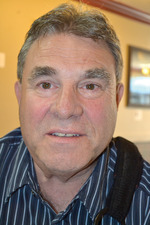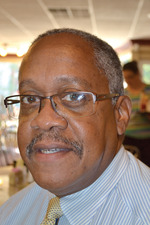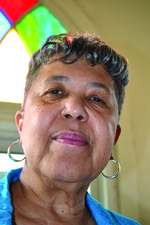In the wake of Ferguson, local leaders reflect on a national tragedy
09/16/2014 08:57PM ● By LevBy Richard L. Gaw
Staff Writer
Imagine, for a moment, that an African American male has just left a convenience store, in broad daylight.
He is a teenager, and he has just stolen an item from the shelves.
A call comes into the local police about a robbery at a convenience store.
The dispatcher gives a description of the robber.
An officer arrives on the scene, and encounters the African American male.
The young man raises his arms, announcing to the officer that he is unarmed.
The officer fires six shots at the suspect, killing him instantly.
Word of the shooting quickly reverberates throughout the local African American community, and for the next several days, hundreds gather outside the local police department, demanding answers that never come.
Looting of local stores begins. Several arrests are made.
Crowds, mostly African American, are pelted by tear gas by local police, who are mostly white.
For the next several weeks, the subsequent events that follow are splashed around the globe and bring the normal function of a town to a deliberate and violent halt.
Now, imagine for a moment that these events all happened here, in Chester County, in the town where you live.
"What If?"
From the moment that 18-year-old Michael Brown took the fire of six bullets from the gun of Officer Darren Wilson on the early afternoon of August 9 in Ferguson, Missouri, our nation became embroiled in a hard conversation, whose talking points have formed a perfect storm of anger, retaliation, wild speculation and a scramble for justice, all while the cameras -- both professional and not -- have rolled in continuous documentation.
In Ferguson, the media had found their pay dirt, their mother lode, their story of the year. Blogs, web sites, news radio, cable TV and the newspapers spilled gasoline on an already smoldering cauldron, and as a young man's murder ripped the fabric out of a town already tested by the issue of race, the entire nation watched as Michael Brown became fodder for the media's grand old chestnuts: Justice vs. Injustice, Black vs. White, Police Brutality vs. the Young Black Male.
I am not naive to the notion that the key motus operandi for contemporary journalism is to be first rather than right, and to induce controversy rather than deduce truth. I am, admittedly, a functional dinosaur of the industry, and am content to know that the facts of this case will arrive slowly.
Given that, I am also not beholden to the "What if?" wheel spin of speculation, and in the wake of Ferguson, and on the heels of the seemingly endless and senseless killings of minority youth at the hands of white police officers in recent years, I have wondered, "What if Ferguson happened here?"
Were I to wander into this conversation, would I even belong? Would my voice even register? As a white male, I have never spent one day in fear of law enforcement. 'A police officer,' I was told as a child, 'is your friend.' In the same context, I am not a police officer, and therefore have never been in the position of having to make split second decisions that could impact my life and the lives of others, be they armed or not. I am a journalist. I spend my life asking questions, so I felt it was incumbent to use my own skills to begin a conversation. I went to Kennett Square to talk with a few of that town's leaders in search of answers, because I had none of my own.
Morning tea and coffee
"Before rage or any other emotion, comes the reality of fact," Leon Spencer said. "Rage does not help anyone in this situation. I am not of a mind to instantaneously become enraged. I know that we're all concerned, but the minute I would become enraged, would mean that I am making assumptions. I don't want to make assumptions."
Spencer gathers at Sinclair's on State Street for mid-morning tea. He is a self-described man of faith, but he is also a creature of facts, and like everyone who spoke with me, Spencer is careful to reserve judgment on the Brown case until all of the facts bear themselves out. Across from Spencer sits Edward Zunino, chief of police for the Kennett Square Police Department. He sips coffee with his left hand; his right is for the moment entangled in a black sling, in recuperation from a rotator cuff surgery.
Zunino has been a member of the department since 1975 and was born and raised in Kennett Square, while Spencer is perhaps the most recognizable person in the town, the current president of the Kennett Square Borough Council and the town's former mayor. Zunino and Spencer have been two of the architects in a town that has gone from blight to resurgence in the last 20 years, from what Zunino called a town with an earned reputation for violence to one that has drawn hundreds to sit in the middle of State Street on Thursdays this summer to enjoy great food from some of the best restaurants in southern Chester County.

In his responses, Spencer is eloquent, even poetic, as he weaves the latticework of the Ferguson shooting into the framework of Kennett Square. Zunino's answers are spoken in the vernacular of someone of his profession, through definitions, actions and desired results. In fact, the entirety of the topic is run through the funnel of how Kennett Square would respond were a shooting of this kind to ever occur there.
"A police chief's responsibility is to provide the service and protection for his or her community," Zunino said. " In order to do that, it is necessary to reach out to other sources, on the local, state and federal level. In Kennett Square, there is a wealth of people our department can call on to help in situations like that. My first line of contact would be with [current Kennett Square mayor and executive head of the Kennett Police Department] Matthew Fetick and Leon. They will allow me to run the situation by them, in order to gain their approval on what my department may have in mind. I want to reach out with [Chester County District Attorney] Tom Hogan, the state police and the FBI."
The task of cities and towns, Spencer and Zunino said, is to destroy misconceptions, one by one, in an effort to bring their communities closer together.

On a sweltering August day in 1963, the Rev. Martin Luther King, Jr. delivered a speech that served more as a wake-up call than merely a dream, yet incidents such as Brown's murder have conspired to spin tragedy into racial biases, Spencer said. While he sees great strides being made in the fulfillment of King's belief that people should not be judged by the color of their skin but by the content of their character, he knows that there is still a cross-section of the American population who views an African American teenager as a thug.
"One of the conditions inherent in humankind is a willingness or a tendency to generalize," he said. "I can't tell you the number of times that people, knowing that I am a man of faith, think that I am a Baptist. I can't tell you the number of times that a vintage sports car is thought to be owned by an Hispanic. We form these biases that kill Dr. King's dream."
Zunino knows all too well the way law enforcement is commonly portrayed in the media, seen in cop shows where officers ride through town with the windows of their vehicle rolled up, carrying an air of detachment and bravado, hidden behind pitch-black aviator glasses. The best way to shorten the "distance" between law enforcement and the minority community, Zunino said, is to maintain good communication with the members and involve them as a resource.
It can start with something as innocent as kick ball; Zunino encourages the members of his department to roll down the windows of their vehicles, and when they see a pick-up ball game going on, to get out of their vehicle and join in.
Community relations, Zunino said, doesn't end with kick ball. Several Kennett Square Police

officers are involved in various community nurturing programs, such as Study Buddies in the East Linden neighborhood, where officers help children with their homework after school, as well as the After-The-Bell Program at the Kennett Middle School, where an officer meets with students once a week in the 'Cops' program, where students learn about police work.
The department has also appointed a school resource officer at Kennett High School who keeps in close communication with administration, students and parents.
"One of the things I am very proud of with the police department is the realization that there must be good public relations," Spencer said. "You are a public servant, and your job is to protect and serve the people, and the best way to serve people is to know them. If you don't reach out to them in a myriad of capacities, you limit your ability to serve them. Likewise, it's incumbent upon the public to know that officers are human beings. They have families. They have emotions. They have the need to reach out to others."
Zunino finishes his coffee. Spencer finishes his tea. Whatever truly happened on Aug. 9 in Ferguson, Mo., the facts will eventually ferret out the truth, they said.
"The media has painted this as a black and white issue," said Spencer. "It isn't a black and white issue. It's a justice issue. I do not know how many black police officers have shot and killed white youth. I do not know how many white officers have shot and killed white youth. But that's not what we see here. We see that a white man shot a defenseless black man. It has nothing to do with the color of a man's skin. It has to do with what really happened."
"To bring justice takes time, sometimes a lot of time," Zunino said. "Assumptions take seconds."
"Just for togetherness"
It is a Saturday morning in Kennett Square, and Linden Street is buzzing with the usual hob knob of activity. Children ride bikes. A man cuts his small front lawn with a push mower. A couple jogs by. The Reverend Maxine Mayo of the New Garden Memorial Church sits in the lobby of the church. The weight of the shooting of Michael Brown is heavy on her, but so is the weight of the African American response to the murder, the steady drum beat that whispers, 'Here we go again.'
When Mayo speaks, she underlines that it is with the knowledge that the facts surrounding the shooting are not entirely known.
"I don't know if [the rage and retaliation by the African American community in Ferguson] was justified, but this type of incident can happen in almost any community," she said. "I think the rage is there, and I think it would be there if something like that happened here. When you hear of something like that, and of course you don't know all of the facts, you think, 'The cops shot another black kid.' It happens all over the country. We're not blaming the police, but why is it happening? What is going on in the mind of the police?
"I don't know the justification for shooting someone six times, particularly if he was in the surrender position," Mayo said. "That's what the community doesn't understand. Could they not have stopped him with a shot in the foot, if you felt compelled to shoot?"
Just as the shooting of Michael Brown represents a microcosm of racial prejudices that many feel are handcuffing full progress toward justice in America, Mayo herself is a reflection of every American leader of color, who speak the same dialogue of injustice but are called upon to carry the conversation forward. The burden of being a peacemaker is often made easier by location and, echoing Zunino and Spencer, Rev. Mayo believes that in Kennett Square, its leaders are not hard to find.
"I know there have been a lot of things have been done, in the name of racial and community harmony," she said. "Last Saturday, there was a block party, simply to get the community together. On National Night Out, the local police force were honored. Things are being done to work on issues....just for togetherness."
In the harsh light of events such as Ferguson, we are reminded again and again that fate is not immovable. It can be nudged, cajoled and pushed in order to bend to our wishes, but only if we are willing to do so. I left the New Garden Memorial Church knowing that the fate of Kennett Square is in the hands of its leaders -- three of whom I spoke with, and dozens more whose names were sprinkled throughout our conversations.
"It is important to appoint leaders in the community who are able to address the fear, the hate, and the anger, because if people see all races come together in leadership, they're more apt to fall in," Mayo said. "I can think of many Kennett Square pastors and organizers of public events, and if something like Ferguson were to happen here, I know they would all form a positive coalition, and I believe that the people would hear them. It would be a time for the community to come together, not tear itself apart.
"It all comes down to how we relate to each other, and our willingness to do so."
To contact Staff Writer Richard L. Gaw, e-mail [email protected].


